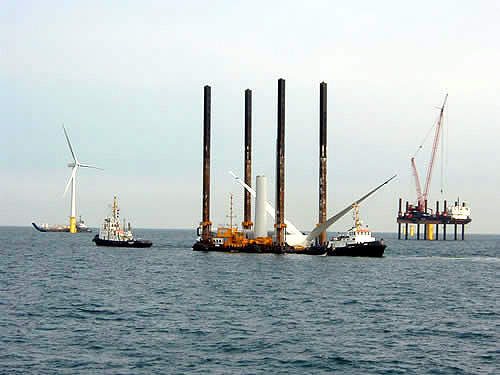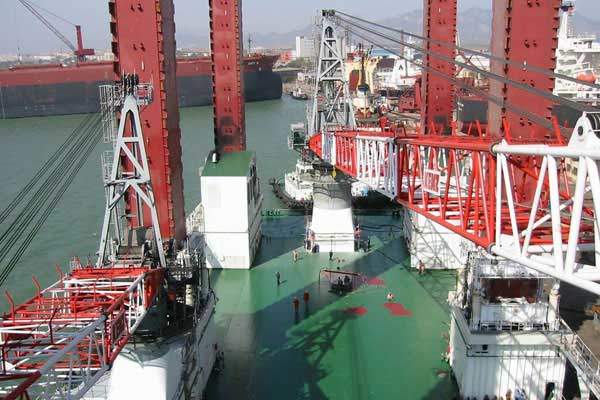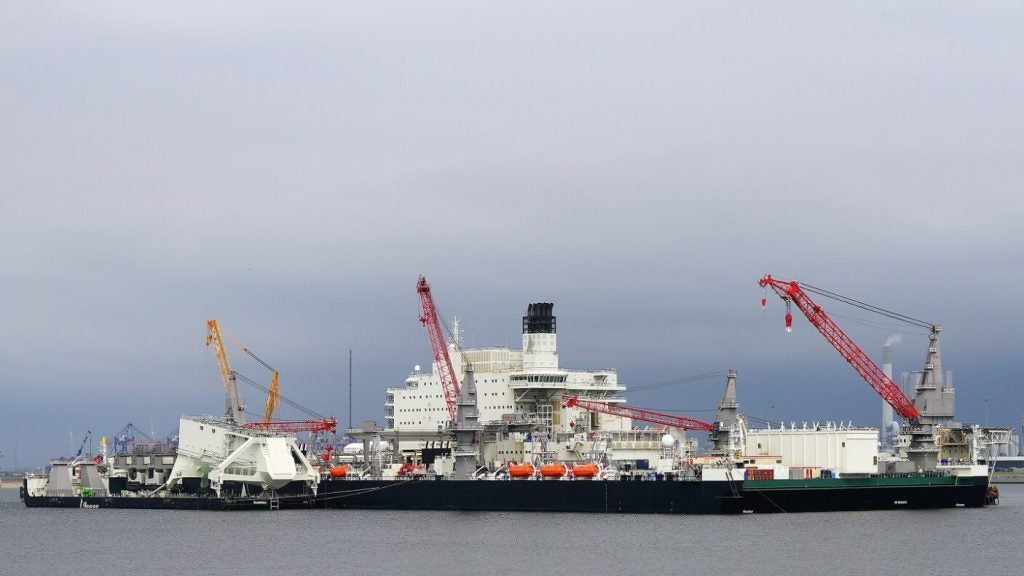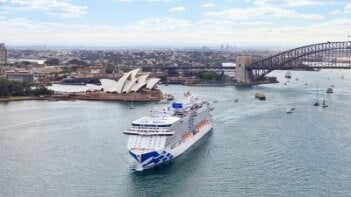The Mayflower Resolution has been designed to install wind turbines in hostile coastal environments. It was constructed in China’s Shanhaiguan shipyard at Qinhuangdao.
As soon as the six-leg vessel arrives at the installation site, it is manoeuvred into place using dynamic positioning and jacked clear of the water, turning the ship into a stable working platform.
The Mayflower Resolution has an overall length of 130.5m, a moulded breadth of 38m and a moulded depth of 8m. It has a lightship displacement of 12,300t at a 2.89m draught and an 8,950t displacement at a 5m draught. It registers 14,547gt. The ship has
an 8,950t maximum payload and a 3,200m² maximum cargo area which can withstand loading of 10t/m². The vessel’s ballast capacity is 8,832m³ in 13 tanks. The system has a pair of two-speed ballast pumps of 1,000m³/h capacity.
DECK MACHINERY
The Mayflower Resolution employs a cylinder type jacking system with each leg handled by four primary and four secondary cylinders. These are retained in position by catch beams which are housed in catch beam rings attached to the jacking cylinders.
The system elevating capacity is 2,500t per leg and holding capacity is 5,000t per leg.
The vessel is equipped with one Kenz EHC 300 / 5500 O.S. pedestal-mounted rope-luffing electric hydraulic offshore crane of 300t capacity at 25.5m radius and 50t at 78m radius. The other crane’s capacity is 50t up to maximum radius of 35m.
VESSEL POWER
Vessel power is supplied from two sets of two Mitsubishi S16R-MPTK-2 main generators, with a capacity of 1,920kW at 1,800rpm, and two Mitsubishi S6B-MPTA harbour generators (276kW at 1,800rpm) located in each of two engine rooms, port and starboard.
One Mitsubishi 6D24TC emergency generator, which supplies 210kW at 1,800rpm, is located in a separate room in way of No.2 leg. Power distribution is via two switchboard rooms, port and starboard. Main power is 690V AC which is transformed to 440V AC and
220V AC for auxiliary machinery and small power consumers.
PROPULSION AND STEERING
The vessel is equipped with four azimuthing thrusters for propulsion and steering. It has four Aquamaster US 205 / 3850Azimuth thrusters units with a capacity of 1,500kW. These use ABB AMA4xxLxL units at 1,800rpm as the main motors. There are also
three 700kW Kamewa TT1650 CP bow thrusters based on ABB AMA400L6L motors.
NAVIGATION, COMMUNICATIONS AND CONTROL
The Mayflower Resolution is equipped with a class compliant dynamic positioning control system. This is a Kongsberg Simrad SDP 11 unit using Fanbeam laser, DGPS. Environmental monitoring is by three gyrocompass units, dual pitch and roll sensors and
dual wind sensor units. Additionally there is an independent joystick control system to control the vessel operation in the event of DP system malfunction.
The ship is also equipped with an Ulstein Marine Automation System (UMAS) for monitoring and control of the vessel’s operational functions. The UMAS is linked to the bilge, ballast, fuel oil and cooling water, diesel generators, high voltage
switchboards and thruster monitoring systems.
The Mayflower Resolution is equipped with class compliant communication and navigation systems for worldwide operation. Equipment installed includes dual radar systems, Jotron GMDSS HF/MF and VHF systems, Inmarsat-B and Inmarsat-C communication
systems, an independent Sperry Marine autopilot system, Sperry Marine echo sounder and Litton water speed doppler log unit. Vessel position is constantly confirmed by two independent global positioning systems. Weather forecast data is obtained by
weather fax and Furuno Navtex reports.
CREW AND NOTATION
The Mayflower Resolution has a regular crew of 34. With the addition of the erection team, the vessel will hold between 60 and 70 people during turbine installations. It is registered with DNV under the notation class +1A1, Self-Elevating Unit, Crane,
Dynpos AUT, E0.












